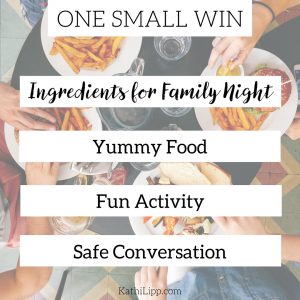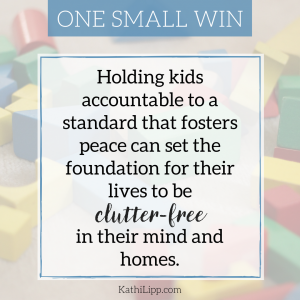
by kathilipp | May 18, 2017 | Guest Blog, Me |

My first child’s high school graduation brought up a whole new set of fears and stress in me. Have I done enough to prepare her for adulthood? Will she make wise choices as she steps out from under our roof and into a world full of options? Will she be able to hold onto her faith in college—at a time when many young people discard theirs?
Her graduation felt like a defining moment in my parenting. I knew I’d done all I could to train her well, to prepare her for success. But now, facing what felt like a Parenting 101 Final Exam, the stakes were high. I didn’t want to fail. I certainly didn’t want my precious daughter to fail.
This tension bubbled up in the days leading to her graduation. Of course, she was dealing with her own emotions surrounding this milestone event and pulling away from me, busy preparing for adventures to come. I was grieving the upcoming loss of her daily presence, knowing before long she would move from our house and pursue her education.
The entire month before graduation was crammed with activity. Prom, sports banquets, end-of-the-year awards, ceremony rehearsals, all mixed into a swirling vortex of angst. So many events, so many decisions.
As graduation neared, our relationship, normally characterized by mutual love, respect, and lots of laughter, became contentious. This culminated in an angry verbal exchange as we walked through the campus parking lot on our way into her Baccalaureate ceremony. I can’t remember what precipitated the argument, but I remember how I felt. Off-balance. Overwhelmed. Defeated.
I had let stress and fear steal my joy.
Have you ever experienced relational stress leading up to a milestone event? Have you allowed that stress to ruin the event for you? For your child?
Heightened emotions come with any life-changing event, but we don’t have to let them rob us of the joy of the occasion, whether it’s a move, graduation, wedding, or some other major event. We can have fun and create precious memories without regret.
When approaching a big event in your child’s life, you don’t have to get caught up in the swirling emotional vortex. You can cultivate peace through journaling or talking with a trusted friend. Speak with a life coach, counselor, pastor or mentor. Talking through fears and concerns with a mom who’s walked the path before you might mean the difference between white-knuckling it through the milestone and really enjoying it.
One of the most important things we can do to maintain our equilibrium during these emotional times is to get alone with God and pour out our hearts to Him.
Jesus demonstrated the importance of getting alone with the Father before ministry. “But Jesus often withdrew to lonely places and prayed” (Luke 5:16). As we prepare to minister to our children during their “big day” we can follow Jesus’ example.
Last year my son graduated and this year my youngest daughter will graduate. I’ve learned a lot going through this letting-go process. I’ve learned to be intentional about processing my emotions. I’ve learned to carve out time in the busyness to be alone in the healing presence of my Father.
Are you facing a milestone event?
If so, how will you cultivate peace and plan for fun as you prepare for the event?
 Elizabeth M. Thompson is a writer and speaker who loves helping women develop meaningful spiritual lives. She and her husband have three children and will soon be empty-nesters. They live, bike, kayak, and hike along the American River near Sacramento, CA. Prayer is her passion. For a free download of “Jumpstart Your Stalled Prayer Life” go to her website: www.ElizabethMThompson.com.
Elizabeth M. Thompson is a writer and speaker who loves helping women develop meaningful spiritual lives. She and her husband have three children and will soon be empty-nesters. They live, bike, kayak, and hike along the American River near Sacramento, CA. Prayer is her passion. For a free download of “Jumpstart Your Stalled Prayer Life” go to her website: www.ElizabethMThompson.com.

by Guest Blogger | Apr 26, 2017 | 21 Ways to Connect With Your Kids, Relationships |

What happens on family night … stays on family night. At least that’s what we said the night I dramatically pantomimed changing my adult daughter’s diaper. It was the final round of Cranium. If my husband guessed correctly, our team would take the win. If not, it was sure to go to the other team.
In the last few seconds, he shouted, “Changing a diaper!”
I raised my hands in victory. “Yes!”
The other team groaned as my husband moved our player piece into the winner zone. My daughter got up off the floor, red-faced and raspy from screeching/laughing.
Now, whenever we decide to play a game on family night, her older siblings (and brother-in-law) always tease her with, “Let’s play Cranium.”
And she always spits back “No!,” much to their delight.
Creating a fun family night
Family night has been a thing in our family since the kids were little. Now that they’re all out on their own, they still love it. So do my husband and I. I credit family night for one of the main reasons we’re a close family.
It hasn’t always been easy. But I’ve learned some things (sometimes the hard way) to make weekly family nights an event they won’t want to miss.
1) Yummy food. If your kids still live at home, this is a night to put something special on the menu. When mine were little, they’d beg for pizza — an obvious way to make the meal fun for them.
There are other nights for “eat your vegetables” and “try it — you’ll like it.” Family nights are a great reason to put out those “Yay! Best mom ever!” foods.
Now that mine are young adults on a meager food budget, anything that isn’t Ramen noodles or Kraft macaroni and cheese puts a smile on their faces. I usually make this my night to put more effort into cooking dinner. It’s also our one dessert night of the week.
Whatever their age, choose a menu (or restaurant) that will be sure to lure them to the table.
2) Fun activity. Don’t let the night end with everyone slipping away after dinner and melding with their devices. Planning an activity keeps the conversation going, often getting into the deeper issues of life. We’re fond of board games, so it doesn’t take much to entice them to play a round or two. Sometimes we’ll hike at a local landmark or head to the nearby city park if the weather’s nice.
Some weeks, like Easter week, we’re simply exhausted. Those are great times to head to the theater or rent a movie to watch at home. This weekend, my heart melted when my youngest curled up next to her dad on the couch like she did as a little girl.
3) Safe conversation. Speaking from some of the most painful parenting lessons I’ve ever learned, I highly recommend saving the difficult conversations for later. Most issues can and should be dealt with individually, but if it’s truly a family matter, we schedule a family meeting.
We work hard at cultivating positive interaction, with more encouragement than correction. For me, the work is especially hard, since I didn’t grow up in a positive environment; too many times I’ve repeated the mistake of being too harsh with my children. Often, it takes intentional work on the parents’ part to create a supportive and affirming family environment.
I’ve watched the work pay off not just on family nights, but throughout the week as well. Recently, one of our adult kids sent us all a group text before a big job interview and instantly got 100% response with many variations of, “You go, girl!”
One Small Win: Whether your kids are just barely old enough to sit at the table, or if they have dining room tables of their own, family nights are a great way to create great memories and foster closeness.

And if you ever find yourself playing Cranium and draw the “pantomime changing a diaper” card?
Do it with gusto.
Your family will be talking (and laughing) about it for months to come.
 Lyneta Smith is an inspirational writer and speaker who lives with her husband near Nashville, TN. Some of her favorite things to write in her planner: date nights and family time with her adult children. She’s owned by a frisky Boston terrier and a tortoiseshell cat. Connect with her at www.lynetasmith.com.
Lyneta Smith is an inspirational writer and speaker who lives with her husband near Nashville, TN. Some of her favorite things to write in her planner: date nights and family time with her adult children. She’s owned by a frisky Boston terrier and a tortoiseshell cat. Connect with her at www.lynetasmith.com.

by Guest Blogger | Apr 12, 2017 | Guest Blog, tips and ideas |

I love the idea of dinner—the coming together for conversation, connection, and a shared table. I like the idea of food and conversation happening around the kitchen table, filling both our stomachs and our hearts. The idea of roasted chicken, fresh from the oven, mashed potatoes, and fresh green beans displayed on an impeccable table with candles glowing makes my heart sing.
That’s just not what dinner looks like at my house.
What my dinner table really looks like
Allow me to set the stage. It is 6:00 pm. It is the “losing it hour.” It is the end of the day and everyone is tired and hungry. The rotisserie chicken from the grocery store is trying to stay warm in the oven without drying out while I warm up the leftover rice and defrost some green beans that have just a touch of freezer burn. The table is littered with crumbs, scraps of paper, and eraser bits. I sit the food on top of it all so we can just eat already. My husband arrives home from a long day and, well, we’ve all had a long day.
We pray and begin to eat. And so it begins. Someone is chewing too loudly. There’s too much lemon pepper seasoning on the green beans. “She looked at me funny” is a constant refrain. Our questions about school end up with answers like, “We did math” and “I liked recess.”
At your house maybe the baby is throwing food and refusing to eat or maybe you are still waiting for the tardy teen to arrive. It is always something. Dinner is burned, attitudes are keeping things lively, or the disagreement from the morning has decided to return for the “losing it hour.” And on a really great night you get all three!
Invite joy to the table – a new way to do dinner
I am on a mission to rescue dinner from unrealistic expectations. My goal is smiles and the rest is just details. To begin this mission I bought three tins of jokes. I wanted to introduce a different expectation—one of connection through fun—and, at the very least, keep the grumpy at bay. For the most part it has worked. The eraser bits are still on the table, the chicken is dry, but we have smiles! About a week after starting this new way of dining my son checked out a book of jokes from the school library for us to enjoy at dinner. I call that winning!
Rescuing dinner from expectations has led to dinners full of fun. Grumpy still joins us for dinner every now and then of course, but we’ve stopped setting a place for him and instead have invited joy to the table.
Here’s a few more ideas, some I have tried and some I will implement soon to give grumpy the boot and invite joy to a place at our table.
– On Sunday nights we watch America’s Funniest Videos while we eat an easy dinner. There is always belly laughter and I LOVE IT.
– Grab some trivia cards from a board game and just ask the questions – no pieces or game board needed.
– Serve dinner that is only finger food – easy for the one prepping and fun for all.
– Buy or make some fun placemats.
– Speak with accents.
– Eat dinner with chopsticks. (Make chopsticks easy for kids to try with this tutorial! http://www.instructables.com/id/Chopstick-trainer-with-only-a-rubber-band-and-ch/)
– Turn on some music and allow it to set the tone for your meal. Are you having Mexican? Turn on some Latin tunes. Having grilled cheese for dinner? Jazz genre, of course. Have throwback night and introduce your kids to the music you listened to growing up.
– Eat a picnic on the living room floor.
One small win: Make dinner fun again by releasing your expectations. Introduce fun at dinner tonight in a way that your family will enjoy. Invite joy to the table.

 You can read more from Bethany Howard at bethanyhoward.com. She writes about finding fuel for joy and growth in the details of the daily. Her greatest leadership exercise has been her roles as wife and mom to three. She is a graduate of Leverage: The Speaker Conference.
You can read more from Bethany Howard at bethanyhoward.com. She writes about finding fuel for joy and growth in the details of the daily. Her greatest leadership exercise has been her roles as wife and mom to three. She is a graduate of Leverage: The Speaker Conference.

by Guest Blogger | Mar 23, 2017 | Guest Blog |

I can just hear you now: “Clutter-free” and “parenting” in the same sentence? For real?
Well, not so fast. Clutter-free parenting is not a one-and-done proposition. When my children were little, I took delight in the nice, neat shelves in my basement, holding up totes clearly marked with clothing sizes. I was also Y2K ready (dating myself here), and had organized shelving stocked fully with massive quantities of food for pending disaster, enough to feed a small country. Yes, some of you are judging me right now while others are in awe.
Okay, so I have my skeletons in the closet of overdoing things when it comes to organization. I readily admit that maybe, just maybe, my focus on being clutter-free and organized bordered on being a little neurotic. Notice the past tense in that last sentence.
Clutter-free parenting as your kids grow older
Making five little people do their chores was stressful, but it does not compare with four college kids who all have jobs and school and a creative twelve-year-old who reenacts Curious George episodes again and again. Somehow the college “adult” status has a built-in entitlement that they just simply cannot do chores nor participate in the clutter-free schooling environment of days gone by.
A little background might help here. I home-educated all of my children all the way through. Yep. I am one of those. I delighted in purchasing books – LOTS of them – and organizing it all. Until … Until our lives were interrupted by a tragedy that transformed our very existence.
Suddenly the pet peeves about clutter really did not matter anymore. Just making my kids happy, just surviving, just trying to maintain some level of cleanliness, that’s where my focus shifted.
Balancing compassion and expectations
The problem with that state of living is that if we aren’t careful, it becomes our new norm. Kids are smart and realize this. The compassionate heart of mommas can, um, enable their disobedient behavior with excuses. I confess I have done this many times. I rationalized in my brain that it was cruel to stress them out with the burden of having to actually chip in around the house. They had a past pain that somehow overruled maintaining a clutter-free zone.
Now I have four kids, all with jobs and in college. “I’m an adult now,” several of my children have informed me. I mused over what those words meant as college textbooks were scattered all over my dining room table, kitchen table, coffee table, well, actually EVERYWHERE! “Mom, I have to work.” “I don’t have time to rinse the plate off.” “Gotta go.” The enabling side of me felt compassionately that it was just too hard for them to be expected to do 5-10 minutes of chores. They were stressed. But then, so was I. I work too.
The climb back to a clutter-free zone with children is not completely victorious. We fail and sometimes give ourselves space and grace when times get really hectic. But we don’t stay there.
When I am tempted to feel guilty and mean about expecting children who live in our home to pitch in, I am reminded that allowing clutter to reign in our lives and in the lives of our children is actually not kind.
One Small Win: Holding kids accountable to a standard that fosters peace can set the foundation for their lives to be clutter-free in their mind and homes.
So to our children who are now young adults, my husband says, “You’re right – you’re an adult now . . . act like it!”
“A servant pampered from childhood will become a rebel.” Proverbs 29:21

 Denise Pass is an author, CCM artist, worship leader and speaker from Fredericksburg, VA, where she lives with her amazing husband and five children. Denise is passionate about writing devotions and music that foster unshakable hope and healing in the face of seemingly insurmountable circumstances. Her ministry, Seeing Deep in a Shallow World seeks to be a compass grounded in Scripture and a place where real problems meet real, transparent faith and needed answers in Scripture.
Denise Pass is an author, CCM artist, worship leader and speaker from Fredericksburg, VA, where she lives with her amazing husband and five children. Denise is passionate about writing devotions and music that foster unshakable hope and healing in the face of seemingly insurmountable circumstances. Her ministry, Seeing Deep in a Shallow World seeks to be a compass grounded in Scripture and a place where real problems meet real, transparent faith and needed answers in Scripture.
You can read more about Denise’s ministry, Seeing Deep, over at www.denisepass.com or connect with her on Facebook and Twitter.

by Guest Blogger | Mar 22, 2017 | Guest Blog, Relationships |

Once upon a time I thought if I could make enough spreadsheets, post enough lists, or structure my planner enough, then I could build the scaffolding for smooth, meaningful days. I imagined days where love, joy, peace, patience, kindness, goodness, faithfulness, gentleness and self-control could just spill right out of my heart.
Turns out “fruit” doesn’t grow on spreadsheets. Nothing against lists, mind you. But through God’s gentle teaching over the past several years, I’ve embraced the natural rhythm of days and grace in the midst of busyness.
It’s a beautifully confounding idea that the miraculous is often present in the mundane. A moment setting aside a scrambling schedule in order to kneel down, look a little one in the eye, and just listen to what is on their heart, is worth all the crossed-off lists in the world.
In short, I’m learning that the “small” can be momentous. That the moments make the days. And that it’s the humblest things that make life the richest.
How a jar can unify your family
Take for example the idea of a simple jar and a few pebbles. What if these everyday things could help unify your family throughout the day? What if it weaved hearts together? Here’s what I propose:
1) Find a jar, bowl or vase.
2) Obtain a group of pebbles, glass gems (as you might use in a fish tank or for the game Mancala), or other memento—one style or color for each person in the family. Even just a slip of paper with each person’s name written on it would do the trick.
3) Each morning every person takes a pebble of another person’s chosen color. Slip it into a pocket, lunch box, brief case, purse, pencil box or backpack. Gather before parting ways for the day to talk about prayer requests for the day.
4) Throughout the day, whenever that person comes across the pebble, it’s a prompt to say a quick prayer for the person it represents, and whatever they might be facing in their day.
5) At the end of the day, take a moment to go around and debrief about the day. Each person asks the person whose pebble they drew how their day was. Then let them know how or when they were prayed for.
6) Finally, deposit each of those traveling gems into your chosen jar. Over time, the intermingled pebbles (or other items) serve as a visual reminder of how cherished each person has been in thought and prayer.

A message in a bottle
In my research for the newly-released Message in a Bottle Romance Collection, I’ve come across some incredible stories of objects and messages in simple vessels. This is just one way to make a living message of your own and create a beautiful tradition.

For a chance to win one of five copies of that book, tell us in the comments: What is one simple but important message you would love your family to carry in their hearts each day?
 Amanda Dykes is a drinker of tea, dweller of Truth, and spinner of hope-filled tales. She spends most days chasing wonder and words with her family, who love a good blanket fort and a stack of read-alouds. Give her a rainy day, a candle to read by, an obscure corner of history to dig in, and she’ll be happy for hours. She is the author of the critically acclaimed Bespoke: a Tiny Christmas Tale, a contributing author to the newly-released Message in a Bottle Romance Collection, and enjoys connecting with her readers on Facebook, Instagram, and Twitter.
Amanda Dykes is a drinker of tea, dweller of Truth, and spinner of hope-filled tales. She spends most days chasing wonder and words with her family, who love a good blanket fort and a stack of read-alouds. Give her a rainy day, a candle to read by, an obscure corner of history to dig in, and she’ll be happy for hours. She is the author of the critically acclaimed Bespoke: a Tiny Christmas Tale, a contributing author to the newly-released Message in a Bottle Romance Collection, and enjoys connecting with her readers on Facebook, Instagram, and Twitter.

 Elizabeth M. Thompson is a writer and speaker who loves helping women develop meaningful spiritual lives. She and her husband have three children and will soon be empty-nesters. They live, bike, kayak, and hike along the American River near Sacramento, CA. Prayer is her passion. For a free download of “Jumpstart Your Stalled Prayer Life” go to her website: www.ElizabethMThompson.com.
Elizabeth M. Thompson is a writer and speaker who loves helping women develop meaningful spiritual lives. She and her husband have three children and will soon be empty-nesters. They live, bike, kayak, and hike along the American River near Sacramento, CA. Prayer is her passion. For a free download of “Jumpstart Your Stalled Prayer Life” go to her website: www.ElizabethMThompson.com.

 Lyneta Smith is an inspirational writer and speaker who lives with her husband near Nashville, TN. Some of her favorite things to write in her planner: date nights and family time with her adult children. She’s owned by a frisky Boston terrier and a tortoiseshell cat. Connect with her at
Lyneta Smith is an inspirational writer and speaker who lives with her husband near Nashville, TN. Some of her favorite things to write in her planner: date nights and family time with her adult children. She’s owned by a frisky Boston terrier and a tortoiseshell cat. Connect with her at 

 You can read more from Bethany Howard at
You can read more from Bethany Howard at 

 Denise Pass is an author, CCM artist, worship leader and speaker from Fredericksburg, VA, where she lives with her amazing husband and five children. Denise is passionate about writing devotions and music that foster unshakable hope and healing in the face of seemingly insurmountable circumstances. Her ministry, Seeing Deep in a Shallow World seeks to be a compass grounded in Scripture and a place where real problems meet real, transparent faith and needed answers in Scripture.
Denise Pass is an author, CCM artist, worship leader and speaker from Fredericksburg, VA, where she lives with her amazing husband and five children. Denise is passionate about writing devotions and music that foster unshakable hope and healing in the face of seemingly insurmountable circumstances. Her ministry, Seeing Deep in a Shallow World seeks to be a compass grounded in Scripture and a place where real problems meet real, transparent faith and needed answers in Scripture.



 Amanda Dykes is a drinker of tea, dweller of Truth, and spinner of hope-filled tales. She spends most days chasing wonder and words with her family, who love a good blanket fort and a stack of read-alouds. Give her a rainy day, a candle to read by, an obscure corner of history to dig in, and she’ll be happy for hours. She is the author of the critically acclaimed
Amanda Dykes is a drinker of tea, dweller of Truth, and spinner of hope-filled tales. She spends most days chasing wonder and words with her family, who love a good blanket fort and a stack of read-alouds. Give her a rainy day, a candle to read by, an obscure corner of history to dig in, and she’ll be happy for hours. She is the author of the critically acclaimed 



